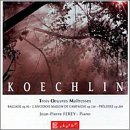| All Artists: Koechlin, Ferey Title: Ballade Members Wishing: 0 Total Copies: 0 Label: Skarbo Release Date: 2/2/1995 Genre: Classical Styles: Forms & Genres, Concertos, Instruments, Keyboard Number of Discs: 1 SwapaCD Credits: 1 UPC: 034060193228 |
Search - Koechlin, Ferey :: Ballade
CD Details |
CD ReviewsRequired listening by France's forgotten 20th century genius 10/22/1998 (5 out of 5 stars) "This astonishing recording of one of the 20th century's inexplicably forgotten figures displays Koechlin at his finest. These thoroughly accessible miniatures evince a clarity and formal integrity sometimes absent from his chamber and larger orchestral works. Each of the 3 works is composed of 7 to 13 independent, but gracefully interwoven tableaux. The sometimes ambling, sometimes somber rhythms convey lyrical melodies that seem to emerge instinctively. His use of harmony, as in "Tres modere", is at once profoundly learned and unmistakably original--complex and surprising, but never murky or jarring. "Tres modere, mais pas trop lent" sinuously wends its way through a variety of moods and harmonies. The brief, mysterious "Adagio Maestoso", eg, shimmers transcendently for all its modernity. Paradox abounds in Koechlin's oeuvere. "L'Accueil de la maison", eg, is by turns giddily child-like, and darkly ironic. The terse, bleak chromatic homophony which begin "La Vieille Fontaine" yields finally to serene warmth.The whimsical little piece "La lecon de piano" may perhaps serve as a synechdochic symbol for Koechlin's work, for his musical progress--indeed for the 20th century: a fitful, vaguely dialectical synthesis of classical rationalism [derived in his case from Faure], and the heterogeneous influences of cosmopolitan modernity. The piece is reminiscent of Satie, but the wit is more subtle; and, as in the "Andante, tres calme", it is tinged with a nostalgic sentimentality that affects, but never cloys. Today, Koechlin (himself an influential scholar and teacher) is known mainly to academics and serious musicians. Despite the obscurity of these works, the performance is intimately knowing and loving; nor could production be improved upon. Those who relish French pianism must not deprive themselves of these rare gems that Ferey has rescued from oblivion. Together, the pieces reveal a world in a few grains of sand, as it were--a world that once visited is never forgotten. James Fanuzzi"
|


 Track Listings (32) - Disc #1
Track Listings (32) - Disc #1